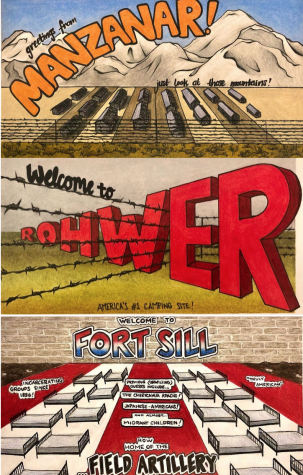Blending printmaking and advocacy around Japanese American incarceration: How Lauren Fujishima hopes to educate through art
Photo courtesy of Lauren Fujishima
A hand-made booklet of linocut ink prints and quotes by McCormick junior Lauren Fujishima. With the booklet, along with a series of illustrated postcards, are inspired by her grandmother’s experience with Japanese incarceration during World War II.
April 29, 2021
Stacked in three pockets of a clear display case, postcards in the lobby of the Ford Motor Company Engineering Design Center showcase colorful, mid-century-style illustrations of three locations in the American South and West: Manzanar, Rohwer and Fort Sill.
McCormick junior and artist Lauren Fujishima created these postcards of Japanese internment sites in an effort to raise awareness surrounding the experiences of the 120,000 Japanese Americans and residents incarcerated during World War II.
“I’m very interested in appropriating art forms that already exist — postcards, children’s books, movie posters, things that are naturally supposed to be super aesthetically pleasing — and using those for other purposes,” Fujishima said. “I wanted to mock how people might view other groups of people’s history as fiction.”
Through her artwork, Fujishima said she draws on her family’s history to push viewers to question the picturesque image the United States often projects of itself. She created booklets of linocut prints and text that drew upon her grandmother’s experience as a young woman subject to anti-Asian racism during World War II.
Fujishima said she began the project because of “a fascination with how there becomes one primary narrative — usually from the White, male political perspective — that comes to dominate (how we view) different events in history.”
Her grandmother, Kazuko Tsubouchi Fujishima, was incarcerated in Japanese internment camps with her parents and three sisters from 1942 to 1944. Kazuko was forced from her home in California and brought to a camp in Jerome, Ark. Fujishima said she wants people to think about what — or who — has been excluded from those images in history.
“There are a lot of people who don’t know about things like that,” Fujishima said. “I want that to change.”
View this post on Instagram
The booklets can be found elsewhere on campus, displayed on a shelf in the Kresge Hall basement for anyone to take. Fujishima said she chose not to provide descriptions with the items to push people to research Japanese internment and the Japanese American experience.
The artwork for both pieces began as projects in her junior art studio course and McCormick Profs. Pam Daniels’ and Alex Birdwell’s Design 395: Art, Making and Anti-Racism class. In the latter, her professors pushed her to emphasize the parallels between current issues of racism in the nation and their roots in past instances of oppression.

Fujishima disseminated the booklets and postcards on campus at the end of Winter Quarter, after a rise in anti-Asian violence since the start of the pandemic.
Although the timing wasn’t intentional, it reflected an appreciation Daniels had for Fujishima’s work. Daniels said the art offered a creative perspective on the national institutionalization of anti-Asian sentiment and put Fujishima’s family experience into the context of other groups unwillingly detained, incarcerated and removed from American society.
Birdwell noted that offering other students and faculty on campus the opportunity to engage with her work by having a dialogue with themselves or sharing the book was critical.
“She was pretty strongly opposed to having it displayed in a case. She didn’t want it to be sort of a museum piece where you would look at it, but you couldn’t take it,” Birdwell said. “She wanted it specifically to be sort of unadorned, just available so that people who just walked by could take one.”
Fujishima said she will order 50 or 60 more copies of her booklet and leave them at various locations on campus. She’s already ordered more copies of her postcards to put in the Ford Center.
She said she hopes to expand her work beyond Japanese American experiences. She’s interested in producing art that sheds light on the lack of reproductive rights, especially forced sterilization, that immigrant women suffer in U.S. Immigration and Customs Enforcement detention.
Fujishima has also brainstormed a project utilizing sexual education posters to comment on the way that American society treats the idea of sex, especially in schools. She said she wants to explore, encompass and expose the historical connection between events and the ways in which the nation works to invisibilize marginalized groups.
“It would be disingenuous of me to tout myself as some sort of activist or an artist interested in commenting on politics and the culture that surrounds race here in America… and not attempt to help educate people about problems where people who don’t share my identity would be considered the victims,” Fujishima said. “I know that’s going to be something I work on in the future, because I’m not done making artwork.”
Email: daisyconant2022@u.northwestern.edu
Twitter: @daisy_conant
Related Stories:
— Communication freshman Asha Yearwood publishes magazine supporting racial justice


